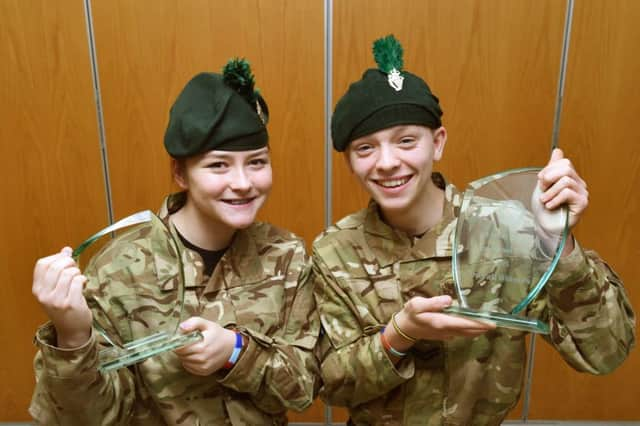Cadets tell story of Carnmoney war hero


The venture set teenagers Hannah Robinson (16) and James White (16) on a moving journey of discovery which revealed the sad tale of Private Hugh Edward Moore, who served in the First World War. And the quality of their research earned them first place in the Province-wide ‘Local Hero’ challenge organised by the Cadet movement.
Cadet Company Sergeant Major Hannah Robinson and Cadet Corporal James White, both members of the Larne Detachment Army Cadet Force, opted to study a particularly modest and unsung local hero, but one with close personal associations. Private Hugh Edward Moore was Hannah’s Great Great Grandfather.
Advertisement
Hide AdAdvertisement
Hide AdBorn in 1878 in Carnmoney, Private Moore left his job as a labourer to join the Royal Irish Rifles and fight for his country in The Great War. Within weeks of enlisting in May 1915, he was preparing for the trenches in France but, just before departure, he received the devastating news that his youngest daughter, Matilda, had died at home aged just three months.


Letters from home became a vital source of comfort for Private Moore and much of that correspondence is still treasured by his family. Conditions in the trenches were miserable, but worse was to come as Private Moore and his comrades were sent to Thiepval Wood, taking part in the historic Somme campaign. Traumatised by the losses he saw all around him, Private Moore survived but then had to face the blow of a letter from home letting him know that his beloved wife, Matilda had died and his young children had been placed in foster homes.
Life continued to be cruel for the young man and, on 9 December 1917 he suffered a gunshot wound to the head, complicated by the effects of gas. Recovery was slow, but Hugh was motivated by the knowledge that his family in County Antrim needed him.
On his return from war, Hugh immediately and without help from others, had to piece his life together, finding work and making a new home for himself and his children. Within a few weeks of his return he took work as a gravedigger at Carnmoney Graveyard because the post provided a small cottage as well as a stable income. He immediately gathered his children around him and managed to bring them up single-handedly.
Advertisement
Hide AdAdvertisement
Hide AdUntil his death at the age of 84, Hugh never spoke or complained of his experiences in World War 1, and he certainly never thought of himself as a ‘Local Hero’.
Praising Hannah and James for the standard of their research, Colonel David McCleery, Chairman of the Army Cadet Force Association, said: “Military history can seem dull to young people, but our Local Hero project encouraged them to approach the subject from a rather different angle. Each cadet team chose, then researched their own ‘Local Hero’, setting the personal story in historical context, to create a broad picture of life and times.
“The exercise in history was useful, but so too were the life lessons. The research process encouraged our teenage Cadets to think deeply about the qualities and attributes which combine to make us think of someone as a real hero. In an age when there is so much emphasis on celebrity, wealth and even exam results, it is important that our young people should appreciate the importance of qualities such as integrity, self-sacrifice and courage.
“Their enthusiastic response to the research challenge was fantastic; both thoughtful and thought-provoking. They unearthed some amazing stories of individuals who have truly earned the right to be celebrated as true ‘Local Heroes’.”